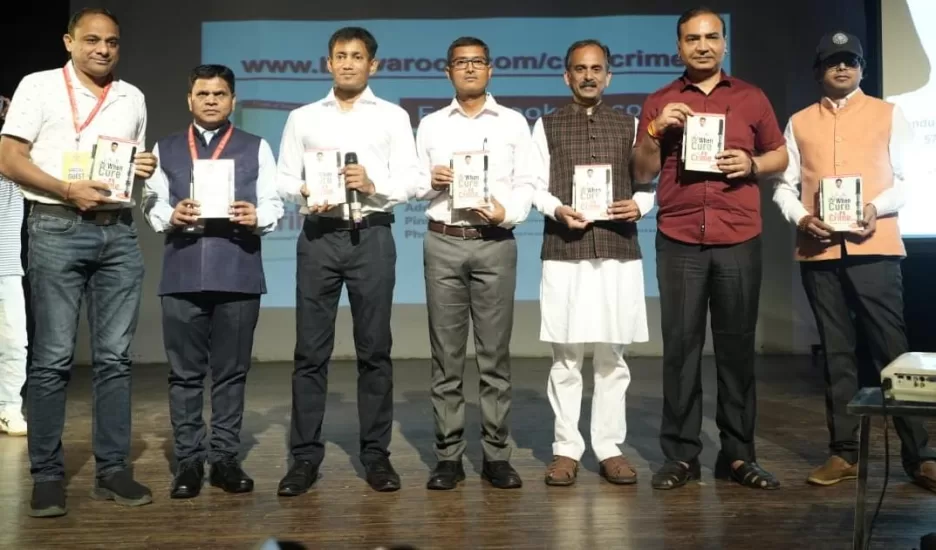# Press conference showcased medical case studies by HIIMS
# HIIMS patients share their medical journey
Hospitals and Institute of Integrated Medical Sciences (HIIMS) held a highly anticipated press conference at the LTG Auditorium in New Delhi on Thursday. The event marked the launch of book titled “When Cure is Crime,” authored by the renowned expert in integrated medical sciences, Dr. Biswaroop Roy Chowdhury.
The conference was honored by the presence of Shri Ashwini Upadhyay, Advocate, Supreme Court of India – 'PIL Man of India,' who shared his profound insights on the convergence of law and healthcare. Dr. Biswaroop Roy Chowdhury, a prominent figure in the realm of integrated medicine, shared with audience the remarkable case studies that showcased patients who have achieved freedom from Dialysis (CKD), Insulin (Diabetes Type 1), and Blood Transfusion (Thalassemia) through innovative and unconventional medical approaches. The event served as a platform for attendees to gain profound insights into revolutionary medical breakthroughs that challenge conventional healthcare norms.
The highlight of the event was the unveiling of Dr. Biswaroop Roy Chowdhury's latest book, “When Cure is Crime.” This book promises to reshape our understanding of healthcare by shedding light on unconventional treatments that have successfully transformed the lives of patients. Dr. Chowdhury's book offers a fresh perspective on the possibilities of medical science, challenging the status quo and inspiring a new wave of thought in the healthcare community.
Dr. Biswaroop Roy Chowdhury said, “Even though we got our freedom in 1947, we're still too dependent on foreign medicines today. Medicines have become a big part of our lives, but it's important to know that the laws about medicines, called the Drugs and Medicine Act, were made by the British a long time ago. Now, these laws are stopping us from using our own ancient Indian health methods, which can often work better than modern medicines. In my new book, I want to share this knowledge with all my patients who've gotten better using GRAD (Gravitational Resistance and Diet). In the book, you'll find QR codes that you can scan to see detailed medical reports, proving that these methods really work. GRAD, which includes things like hot water treatments, has helped cure problems like chronic kidney disease and both types of diabetes. In the book, my patients, both young and old, share their stories of getting better, showing that true health freedom is possible.”
Acharya Manish Ji, founder of HIIMS, gathered attention over the importance of embracing traditional methods for treating various types of diabetes, citing a report that highlights the potential of such approaches. He also underscored the need for a transformative change in the education system, advocating for the compulsory inclusion of Ayurvedic studies in every school curriculum across India. He urged students to learn about Ayurveda, and he called upon the government to take action in making this vital knowledge accessible to all.
Shri Ashwini Upadhyay, Advocate, Supreme Court of India – 'PIL Man of India,' echoed these sentiments, adding, “The existing Drugs and Magic Remedies Act of 1954 needs a thorough reevaluation. If the government doesn't take the necessary steps, I am prepared to challenge it in court. Our healthcare system should embrace our traditional methods and provide them the recognition they deserve.”
He further emphasized, “Modern medicine, while effective in many ways, can sometimes be a destructive system. Naturopathy, with its focus on natural remedies and holistic approaches, should be promoted as the primary health treatment system.”
Dr. Biswaroop Roy Chowdhury made a compelling presentation, sharing his extensive research and the success stories of his patients who have experienced remarkable recoveries through unconventional medical methods. Attendees were provided with a unique opportunity to engage directly with the author during interviews and Q&A sessions, gaining a deeper understanding of his groundbreaking research and the transformative potential of integrated medicine.

